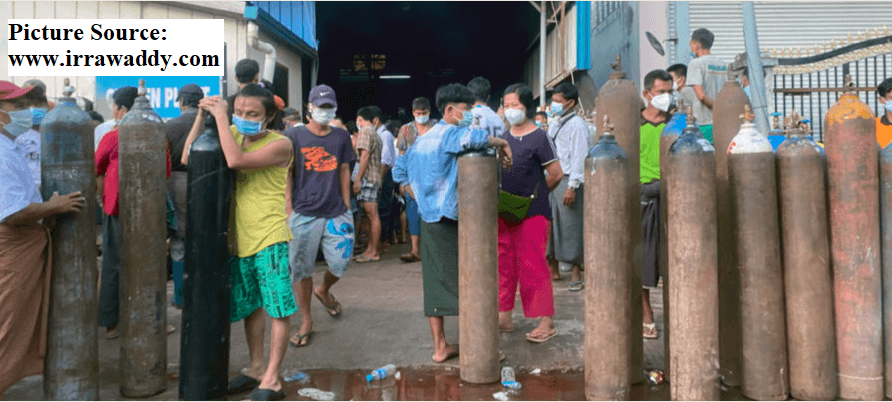
It’s no doubt not the only one in these dire times of ours, but Myanmar is a prime example of a country that had to confront dual stressors, Covid-19 and “political conflict” (understatement), in recent months. To make matters worse, its population faces numerous obstacles to receiving essential mental health services. Indeed, the mental distress of Myanmar people increased during the Covid-19 pandemic and especially after the coup in 2021, with likely long-term impact. In this article we will discuss the severe psychological distress of Myanmar people (both healthcare workers and the general population), hit by the double whammy of a pandemic and a coup.
Limited data exist on the burden of mental health issues in Myanmar, but the burden already seemed relatively high in pre-Covid times. One of the few recent reports on this issue showed that 18% of Myanmar adults already suffered from mental distress before the Covid-19 pandemic and the coup. In addition, the lack of a clear mental health policy & legal framework, inadequate resources, neglect, stigma, and community cultural misunderstandings on mental health issues limited access to mental health services. When Myanmar became a democratic country (2015-2020), or at least seemed on the right track, there was some progress in this respect, with the establishment of community-based mental health projects and other counselling services. Still, these weren’t implemented on a larger scale.
And then the Covid pandemic hit the world, including Myanmar. On 1 February 2021, the coup happened, with the disastrous outcome you know, also on the streets. The mental “collateral damage” has been huge, with the pandemic and the coup often interacting in a vicious way, thus aggravating people’s mental health. Just an example, perhaps: client registration data from an online free counselling service (Mind Healers Myanmar) stated that over 300 Myanmar clients requested counselling services over a period of 28 days in August 2021 due to Covid-19 related stress after the coup. The suicidal risk among young people also increased since the coup. For many, Covid-19 and the coup have acted like dual stressors, with an increase in severe mental health problems in the country as a result.
Especially in wave three, thousands of preventable Covid-19 deaths occurred in Myanmar, with an average of over 100 deaths per day due to lack of access to essential life-saving services, shortage of essential drugs, oxygen and healthcare professionals and health facilities. The main reason for this tragic situation has been the post-coup health system collapse due to relentless attacks by the Myanmar Junta, led by Min Aung Hlaing, and its military terrorists. During the first six months after the coup, the military raided public or private hospitals, and arrested and killed healthcare workers. The country is almost a “failed state” now under the Military Junta, with a collapsed health system as a key symptom. Although government healthcare workers did not return to public hospitals, they still tried to help Covid-19 patients through free consultations by phone or online. For example, some ministries of the interim National Unity Government of Myanmar have been providing mental health services through online or phone calls to fill the gaps of severe mental health needs of Myanmar people, and Mind Healers (Myanmar) set up a mental health service in collaboration with the Ministry of Humanitarian Affairs and Disaster Management, from the National Unity Government. Many Covid-19 patients received care at home, though, without proper treatment and equipment. As a result, caregivers witnessed great suffering and deaths of their beloved ones, leading to extreme psychological trauma during the third Covid-19 wave.
Myanmar people are also suffering great mental distress due to the human rights violations and crimes against humanity committed by the Junta. Some people have directly suffered traumatic experiences like being imprisoned, physically attacked, or losing family members or friends. Others suffer from a deep sense of insecurity in this failed state, compounded by a huge economic crisis. They worry a lot, and have often lost hope for the future. Some people may argue that Myanmar people have enough psychological “resilience” to withstand mental distress, given their turbulent history in recent decades, but that is wrong. In fact, it’s probably the opposite. Myanmar has past experience of struggling with economic and political crisis under a military government for over 50 years, ruled by fear and torture. The military’s violence to dissidents and ethnic minorities has also led to massive displacements to hard-to-reach border areas and refugee camps in neighboring countries, limiting data availability on mental health cases. As mentioned above, the mental health situation in Myanmar was already dire before Covid, and given the above, it’s easy to see why. Since the pandemic and coup, barriers to essential mental health services have only gotten worse.
There is an urgent need for relevant and easily accessible interventions, like online counselling and emotional support for mental health distress, as well as linkage to care for severe mental health diseases. Some pre-existing professional counselling services and newly formed volunteer counselling services provide free online emotional support sessions and counselling services in Myanmar, now that the Junta restricts some non-governmental health services. Mental health services face huge resource limitations, though, and require collaboration with and more support from international technical and funding organizations. Such services may meet the short-term demand for mental health services and reduce the potential risk of extreme mental health problems (with long-term negative consequences) in Myanmar.
In the longer term, clearly, we hope for better times for our country…